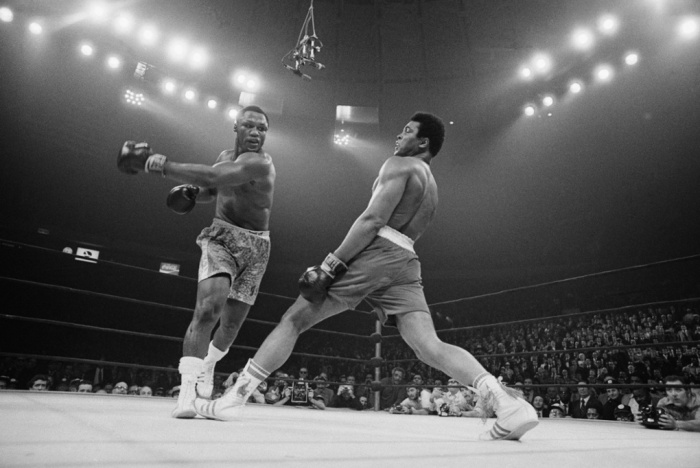
When The World Was in Black & White
Muhammad Ali, The Poet Laureate of The Sweet Science
There was a time, several generations
ago, that this blue sky world was a black and white world with no
gray in between. There was a right way and a wrong way. There was
up and there was down. You towed what ever line you had to tow and
you made no waves. But there was a change in the air. Things were
starting to evolve and with that evolution came along a self
described poet who would become a part of a revolution. He was
introduced to the world as Cassius Marcellus Clay, Jr. This poet
came along during a time where America had marginalized the men of
color as second class citizens who hadn't earned the right to be at
the table or to speak the unspoken truth that had been muted for so
long in our history.

Here was Cassius Clay, Jr. a brash,
self promoting, in your face, bigger than life, large and in charge
person who was always speaking and people were listening,. And for
those Americans , those Americans who were in charge and controlled
the the system, Cassius Clay, Jr. would come to represent a change
that they were reluctant and arrogant to accept. When Cassius Clay
stepped into the ring and fought Sonny Liston for the heavyweight
title in February of 1964, he stepped out of the ring as Muhammad
Ali, a man reborn of faith, conviction and purpose.

What happened in the ring in February
of 1964 was a prophecy. It wasn't the fact that a title had been
won, it was the fact that an icon had been created and a legend was
in the making. What Muhammad Ali was as a man would be something of
a revolution in the political world and with society as a whole. The
press couldn't contain him. He refused their attempts to place him
in their box of black athletes where they should accept the
graciousness of the press and be humble with your talents because we
can easily take that away from you. With the possible exception of
Jack Johnson, many black fighters were humble and passive in their
championship. They accepted their role and played the game without
protest. Ali would not be a party to any of that. But there had to
be a way to bring him back in line, to play the game without protest.
And that way would be to draft him into the military. But that way
turned out to be the detriment to Ali's career.

Ali would come up for the draft and in
March of 1966, Ali made this statement, "My
conscience won't let me go shoot my brother, or some darker people,
or some poor hungry people in the mud for big powerful America. And
shoot them for what? They never called me nigger, they never lynched
me, they didn't put no dogs on me, they didn't rob me of my
nationality, rape or kill my mother and father.... How can I shoot
them poor people? Just take me to jail."
And
so it had begun. They went after Ali for not playing the game. He
was stripped of his titles, his license to box was revoked, his only
means to making a living was taken away from him. The American
system had did something that no other agent could do, it turned Ali
into a soldier of peace. Although he fought opponents inside a 23' X
23' ring, he would stand for a just cause of ending a war that would
divide a nation and leave behind the scars and toll on life and
treasure that took a few generations to heal.
Ali,
by all standards, was an anomaly to the sports world. Here was a man
who stood his ground on the Vietnam War. His peers in the sports
community held a conference with Ali to convince him to honor his
duty and serve in the military. But with his calm and resilient
command of his presence, he had won over his peers that was
unprecedented. This wasn't just about just a war any longer, it was
a convergence of idealism, of ways of igniting thoughts, of not just
rolling over and accepting your faith. This was who Ali was
becoming, not just a boxer, but a symbol of hope, of strength, of
character, of integrity. Ali was the unofficial freedom fighter. Every athlete today, regardless of color,
owes Muhammad Ali a debt of gratitude for forging new terrain to
their profession. They should also learn to accept a little humility
as they stand on the shoulders of Ali when they accept those huge
signing bonus and product endorsement contracts.

In
time, The Supreme Court would rule in Ali's favor and overturn his
conviction for evading the draft. It came at a cost to him as he was
forced into a public exile during the duration of his appeal. Many
would argue that he was in his prime and lost out to the boxing world
as it moved on without him. But this was Ali, he was never the
underdog. He picked himself up and went back to work in spectacular
form. He became a champion once again in more ways than one.
And
as the black and white world slowly dissolved to color, the twilight
of Ali's life was met with challenges. The feet were not as swift
any more, the hands were not as steady any longer. Ali's once poetic
style had become silent. His body, his once shining temple of
physical endurance, had begun to betray him. We saw him now, we
remember him then, in this black and white images, of a man standing
on top of the world that he had changed...for the better.
No comments:
Post a Comment